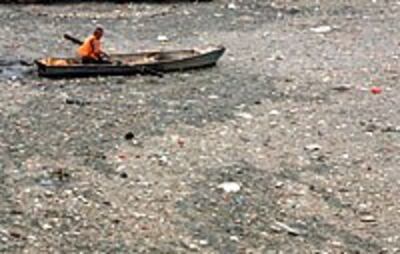
China’s government has halted new development projects on some of the country’s most vital but polluted waterways, winning praise from experts despite concerns that the crackdown may fail to go far enough.
On July 4, China's State Environmental Protection Administration (SEPA) announced it would block approval of new projects in six cities, two counties, and five industrial zones that are blamed for polluting major rivers, including the Yangtze, the Yellow, the Huaihe, and the Haihe, according to the official China Daily.
The moratorium will last for three months, but SEPA vice minister Pan Yue said the ban would remain until pollution sources are shut down and treatment facilities are put in place.
In June, Water Resources Minister Chen Lei reported that nearly a quarter of China’s population, some 312 million people, lack access to safe drinking water. But this may be a low estimate. In 2002, a United Nations Development Programme (UNDP) report put the figure at 700 million, or more than half the country’s population.
In interviews with Radio Free Asia, environmental experts welcomed the latest crackdown on poor water quality but voiced concern over the likely difficulties of getting local compliance and support.
We have a lot of anecdotal evidence of cancer, tumor, and miscarriage rates being much higher in certain river basins and around certain lakes,
Dumping a ‘common practice’
Jennifer Turner, coordinator of the China Environment Forum at the Washington-based Woodrow Wilson International Center for Scholars, said that it is common practice for Chinese chemical companies to dump directly into sources of drinking water.
“SEPA did a survey in 2006 that found that something like two-thirds of the 21,000 chemical plants in China are located on the major rivers near drinking water sources,” Turner said. “So, yes, the Chinese people are being poisoned.”
“We have a lot of anecdotal evidence of cancer, tumor, and miscarriage rates being much higher in certain river basins and around certain lakes. What’s encouraging for me is to see SEPA really starting to talk about the health issues.”
Turner said that SEPA “does have limited power” to stop projects, citing a similar stop-order in January 2005, mostly for large power plants. In those cases, said Turner, the projects had begun construction without filing the required environmental impact assessment reports.
“A few months afterward, a lot of the projects were put back on line,” Turner said. “But the fact that [SEPA is] once again starting to try to close down projects means that they’re making noise.”
Turner said that an outbreak in May of toxic algae at Taihu Lake in China’s eastern Jiangsu province may at last provoke a powerful push for change.
Problems with compliance
“This is a major symbol for China. It’s one of their biggest lakes, and it’s been a cesspool for many years. And it’s been in the campaign—it’s been in the Five-Year Plans for I think the last two if not three Five-Year Plans for cleanup. And now, it is just so ghastly that you can’t pretend that the campaign has worked anymore.”
Daniela Salaverry, co-director of the China program at Pacific Environment, a San Francisco-based nongovernmental organization, said that getting local officials to comply with SEPA rules has always been difficult.
“Implementation, given the complexity of China’s government structure, is always going to be a problem,” Salaverry said.
“But just recently the party leader of Jiangsu province—a top official but at the provincial level—made a commitment that his province was going to sacrifice 15 percent of their GDP for environmental cleanup. And so I think that is a good sign.”
Salaverry said that recent incidents like the algae bloom and protests against unwanted development have helped mobilize public opinion for tougher enforcement measures. But the task of reversing decades of damage will be immense.
“People are feeling empowered to get involved, but at the same time you have generations now who are used to living in polluted cities and drinking from polluted waterways. And so that’s become the norm, and I think it will be hard to change that.”
Original reporting by Michael Lelyveld. Edited for the Web by Richard Finney.
